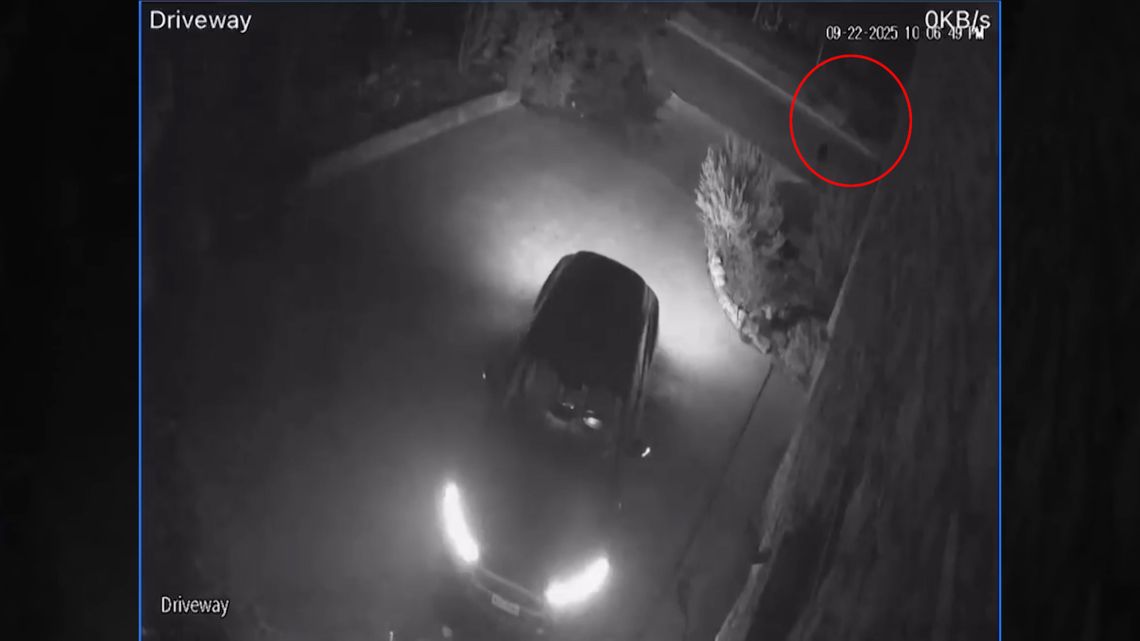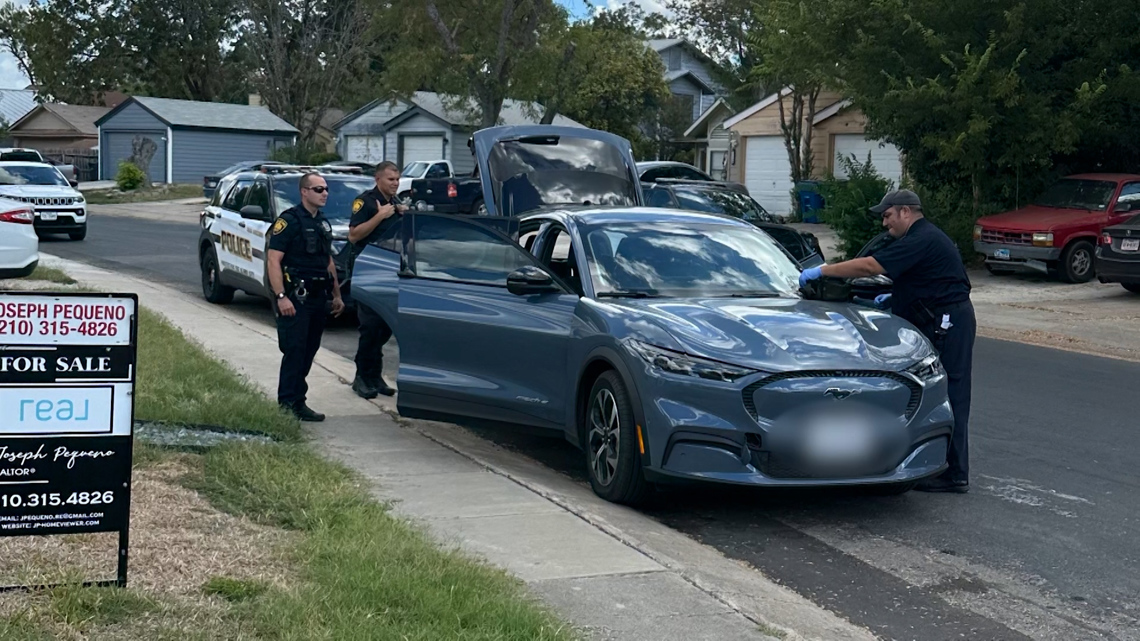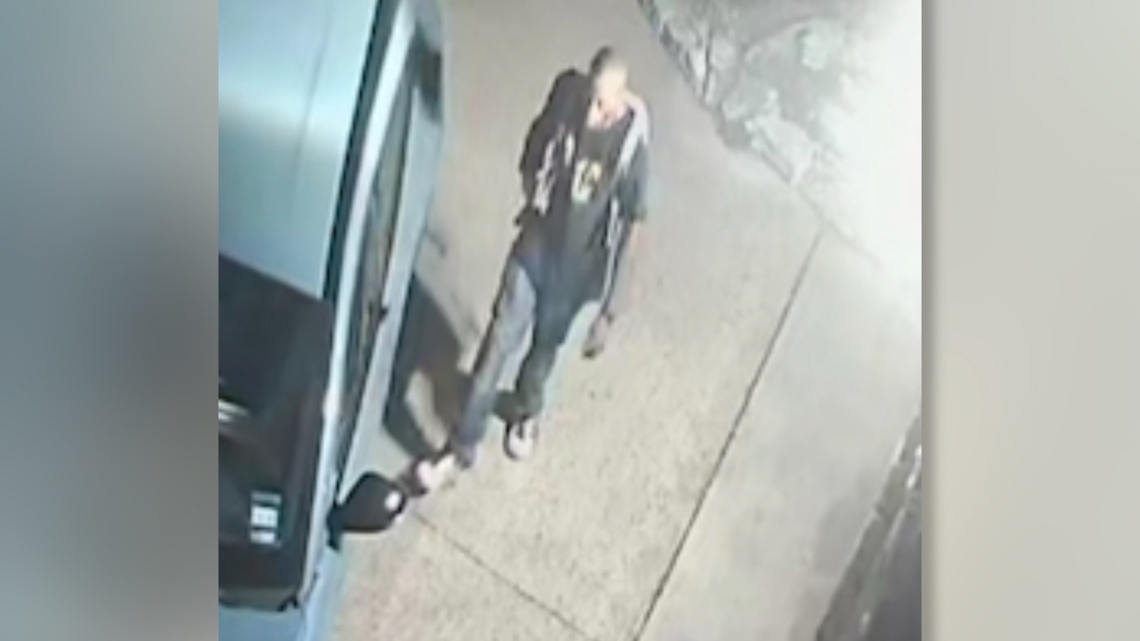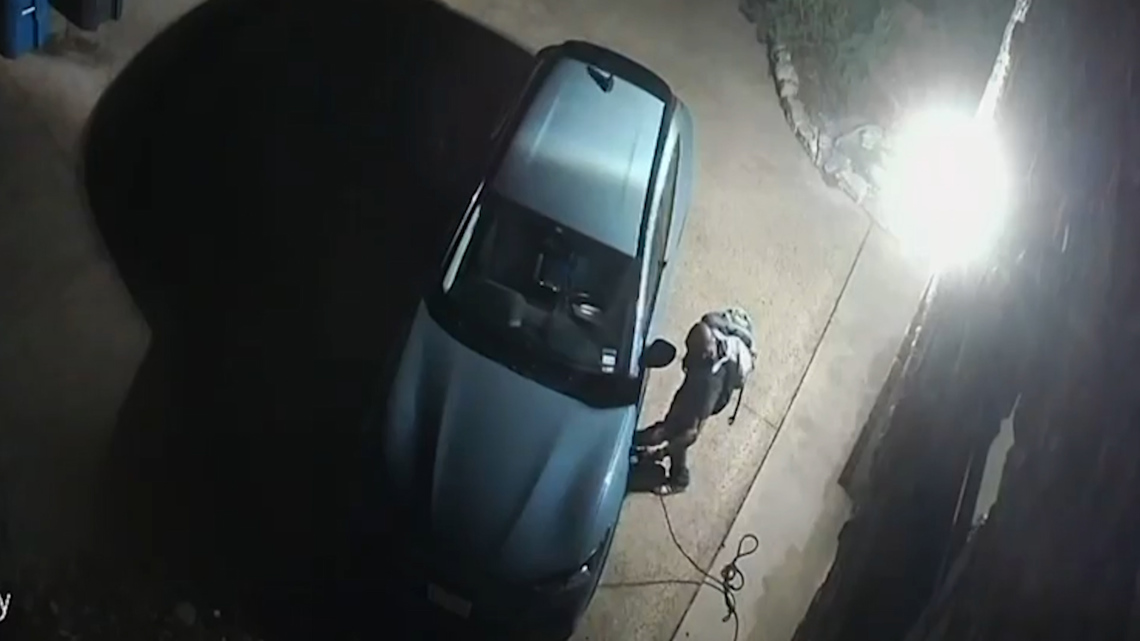The locked Ford Mustang Mach-E was stolen in seconds. Detectives believe the suspect hacked the key signal using a “relay” device.
SAN ANTONIO — After a northwest-San Antonio woman woke up Sunday to find her locked electric SUV missing from her driveway, detectives believe the theft was carried out with technology that lets thieves start and drive keyless cars without a physical key.
Wendi Sanford Green told KENS 5 she discovered her Ford Mustang Mach-E was gone from her Kings Grant Forest driveway just before sunrise.
Security video shows a man walking past the vehicle, which momentarily lights up and unlocks. As he approached Green’s driveway, the motion-sensor security lights momentarily scare him off. But he returns seconds later, unplugs the charger, opens the door and drives away.
“The charger’s laying in the driveway and the car’s not there,” Green said. “It was like that, ‘Dude, where’s my car?’ moment.”
Green said one key fob was locked inside the vehicle and another was inside her house. She called police and reviewed home security footage, which she said shows the car lighting up and unlocking moments before the suspect appears on camera.
“At first I thought I must have dropped my key fob at some point,” she said. “I thought, ‘My car is locked, I’m safe, I’m good.'”
Green said one of the detectives with San Antonio police assigned to the case described the theft as a crime of opportunity, saying it appears the suspect had a “relay device” and Green’s fob signal was picked up by chance.


The detective’s explanation, Green said, changed how she thinks about car safety—realizing that even a locked, well-lit driveway isn’t foolproof when technology can be turned against you.
“I found out there’s a relay device that hacks into your key signal,” Green explained. “It can basically unlock a car, light it up, start it and allow it to be driven just like it’s a key fob.”
In relay attacks, thieves use electronic devices to capture or amplify a key fob’s signal and trick the car into believing the key is nearby. That allows the vehicle to unlock, start and be driven away without visible forced entry.
Using the Ford smartphone app, Green helped police track the Mach-E by GPS to a vacant house near Babcock and De Zavala, about six miles from her home. Officers recovered the vehicle and collected evidence, including fingerprints, a paper California license tag and plastic glasses the suspect left behind; detectives also said they are testing for DNA.


Experts say electric vehicles are still less likely to be stolen than gas-powered cars, but thefts involving keyless systems are becoming more common. Studies show more than 90% of vehicles recovered by private trackers last year were taken without a physical key.
These thefts often happen in the early morning hours while cars are parked or charging in residential driveways.
When Green got behind the wheel to drive her SUV home, she was startled—the car’s GPS began navigating automatically, picking up where the suspect had left off. His iPhone was still programmed to the vehicle.
“It starts telling me to turn right at the next light,” Green said. “It was giving me directions he GPSd in my car (for) how to get to the VIA bus stop that was right there off of Babcock and Spring Ridge.”
Neighbors across the street from where the SUV was found told Green their cameras captured the suspect walking away from the vehicle. Green said their footage shows the suspect carrying two backpacks and headed toward a nearby bus stop.
During our interview, Green noticed damage inside the center console: the built-in wireless phone charging pad beneath the radio had been cut out and removed. No public record yet confirms a case exactly like this one—a built-in wireless charging pad stolen from inside a car. But the theft aligns with broader patterns: thieves targeting removable electronics and charging infrastructure.
In 2024, The Associated Press reported that thieves are targeting EV charging cables, especially in public charging stations, often stealing them for copper wiring.
“He was a pretty high-tech thief,” Green said.
Green said the thief also took her purse; she received a fraud alert from her bank when someone tried to use her card around the time her car was stolen. The Mach-E sustained minor scratches, she said.


Security experts and law enforcement advise owners of keyless and electric vehicles to take precautions: park in a locked garage when possible, avoid leaving vehicles charging unattended outdoors overnight, store key fobs in signal-blocking pouches or metal containers, and disable passive or automatic unlock features if the vehicle allows. Green said she has purchased Faraday pouches to store her key fob, iPads and MacBooks—signal-blocking bags designed to prevent hackers from reading wireless data.
If you have any information on this case, or if your security cameras may have captured footage of this car theft, call the San Antonio Police non-emergency line at (210) 207-7273.
